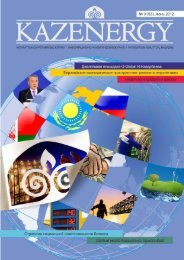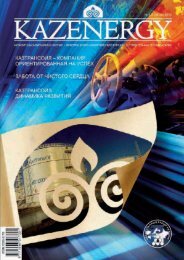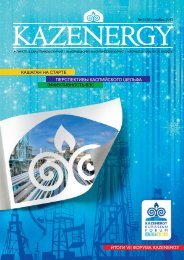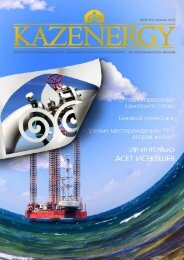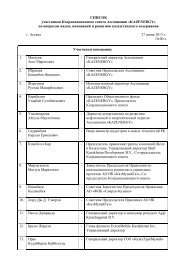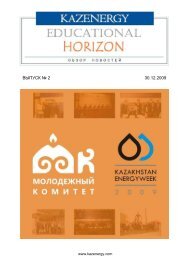â 5 (49), 2011 - KazEnergy
â 5 (49), 2011 - KazEnergy
â 5 (49), 2011 - KazEnergy
- No tags were found...
Create successful ePaper yourself
Turn your PDF publications into a flip-book with our unique Google optimized e-Paper software.
kazenergy forumtential to become a Nabucco “killer” by makingthe EU flagship project irrelevant. SouthStream has a greater capacity than Nabucco,has similar target dates for completionand would largely reach the same CentralEuropean clients.For Europe, building too many pipelineswould make little sense. Although theywould potentially introduce competition betweendifferent suppliers, the high constructioncosts would also likely inflate prices forconsumers. On the business side, returnswould be too small to justify several projects,meaning some may have to be abandoned.There are also important political dimensionsto consider. Rather than being cost effective,some of the projects can be viewedas political. Such projects do not necessarilymake business sense. Some have the avoidanceof transit as their rationale. Nabuccois recognised as being of “European interest”.However, other projects which do notenjoy the same status, like South Stream,have received backing from some EU MemberStates; Bulgaria, Romania, Hungaryand Greece. If both were to be launched it isunclear what the position of those countrieswould be.All the planned projects that I have referredto, including those of the Southern Corridorand South Stream, incorporate sectionsof existing pipelines. When all the projectsare put on the same map, a clear overlap betweenseveral projects becomes visible.The need for massive investment to meetfuture energy demand is well documentedand set to remain for the decades to come.Cancellation or even postponement wouldendanger the security of supply and in consequencethe economy as a whole. Energyinvestments are among the most complexand capital-intensive in the world. Theytherefore require a high level of protectionagainst political risk.But therein lies the difficulty. Companiessuch as Gazprom, before investing colossalamounts in new production fields, must becertain that gas will be purchased. This issecurity of demand. This is a very pertinentquestion in <strong>2011</strong>, and a very difficult one toresolve. Prior to the current economic difficultiessecurity of demand was taken forgranted particularly from large consumermarkets such as the European Union.The economic crisis has had a significantimpact on energy. The slowdown of industryhas reduced energy demand in all sectors:construction, the car industry, services etc.In this context it is noteworthy that for thefirst time since the Second World War, electricityconsumption (and therefore demand)has fallen. The economic crisis has thereforedemonstrated that security of demandis also capable of fluctuation depending oncircumstances.The financial crisis, a corollary of the economiccrisis, has also had its effects. Investorshave become more cautious, credit istight and major projects are being reconsideredin the light of these new circumstances.To complicate matters even further, we haveseen the spectacular price crash, with a significanteffect on corporate cash flow.The emergence of shale gas on the US marketis perhaps an even more significantphenomenon. The lack of suitable technologyhad previously prevented exploitationof this gas whose existence has been knownfor some time. Now thanks to a technologicalbreakthrough shale gas is being produced inthe US, thus making the North Americanmarket self sufficient. Remarkably as a consequence,LNG imports, which were developedby large LNG producers, are now excludedfrom the very market for which theywere intended.Today, large quantities of LNG, previouslydestined for the US market, are now availableon the world market. There is thereforea surplus of gas, at least on the Europeanmarket, thanks to this shale gas factor andcombined with the fall in demand.Therefore at this point in time, there is anew, though perhaps not dramatically differentsituation. It requires all players to reviewtheir positions and most likely to considernew policy directions.This is an almost permanent and regular exercisefor the EU. EU energy external policyis dominated by bilateralism; the EU doesnot yet speak with one voice on this issue.However significant efforts in this directionare now being undertaken.For its part, Russia is faced with the usualchallenges of a supplier; what investmentsto make, whether and to what extent to developand LNG industry, which new marketsit could develop, etc.More generally, the events of the last twoto three years prove once again that historyconstantly changes and that nothing is28 № 5 (<strong>49</strong>), <strong>2011</strong>






